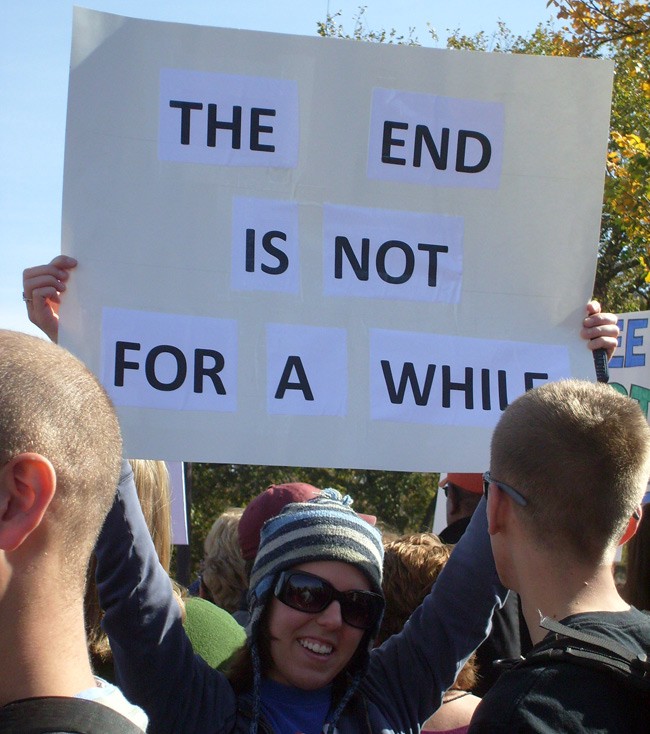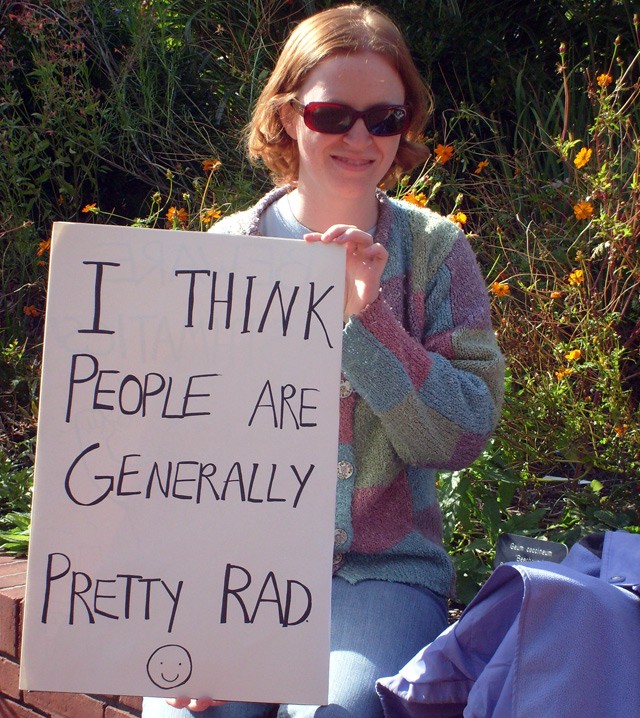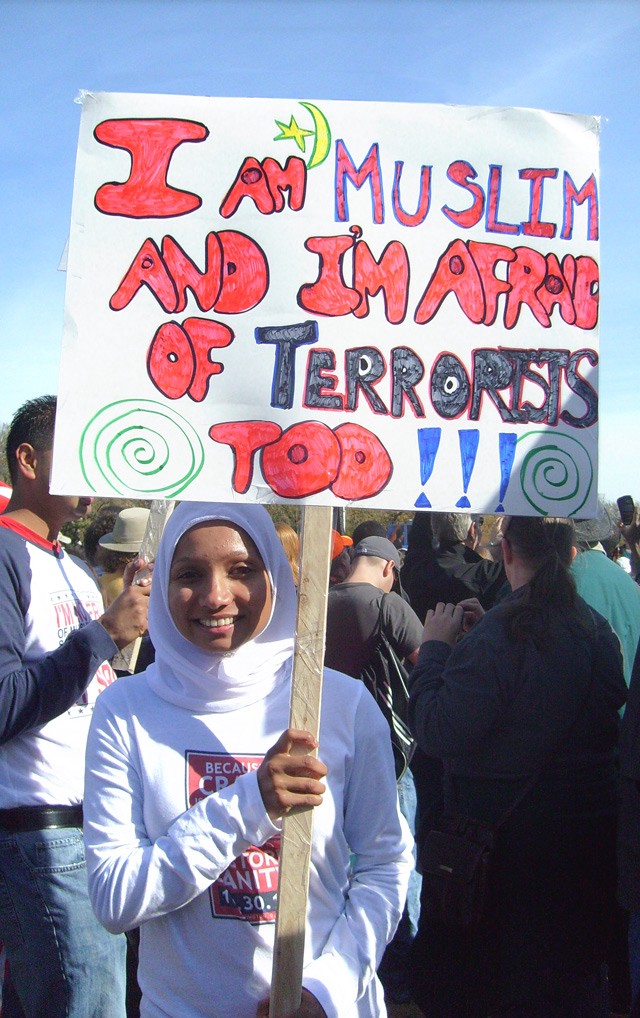The Rally and the Velvet Rope: Is Jon Stewart Still Our Fellow Citizen?

At least half the mysterious but immense number of people who attended Saturday’s Rally to Restore Sanity and/or Fear didn’t see or hear one iota of the stage show, because there were way too many people crowding round a woefully insufficient number of speakers and Jumbotrons. But nobody seemed to mind too much about missing the show, because they were having so much fun comparing costumes and signs, and giggling together over how weird “this whole thing” was. The atmosphere as I roamed about the massive crowd was uniformly giddy all day long.
On October 20, Jon Stewart appeared on Larry King, who asked him about the fact that NPR had forbidden its reporters to attend the rally. Larry King asked Stewart, does that hurt your feelings? and Stewart said no, no. They are guessing, he said, that it is a political rally. (It’s just traditional journalistic practice to avoid political events if you work for a news organization, unless you’re reporting on them; I don’t know why they made such a deal out of that.) And:
And they are guessing wrong, my friend. This is not a political rally in any way, shape or form. It is a visceral expression of a people fed up with the reflection that they are shown of themselves as a divided people.
To the extent that Jon Stewart’s nominal reason for staging the rally was to present to the public a more truthful reflection of itself as a diverse, friendly, reasonable people who can agree to live and work and endure hardship together peaceably and graciously, the event was a roaring success. Every one of the many thousands I saw was patient, pleasant and willing, no matter how trying the circumstances, how difficult it was to see or hear or how suffocatingly crowded it became at points which, my God, it was worse than being in the mosh pit at a Clash show, I’m not kidding. Also I have never seen such a perfect central-castingly diverse crowd, and I have to say it was thrilling, just that. Every color, every age, every everybody. I overheard one excited middle-aged guy talking to his kid on a cell phone. “I’ve never experienced anything like it! They’re not the angry, yelling — everyone is nice! It’s a hoot!” This was a widely-held view.
The rally failed in two big ways, though.

One, it was not the apolitical event it was claimed, or maybe just hoped, to be. Though a Republican, Sarah Dorminy, prominently rode the so-called Sanity Bus featured on The Daily Show in the days before the event, it didn’t appear that many (or even, really, any) Republicans or conservatives were present in the crowd; or maybe I should say that if there were any, nearly all were going incognito. It would have been so great to have seen some Tea Partiers for Sanity in the mix, some Republicans for Sanity. I imagine they would have been welcomed with open arms. However, it seems clear from remarks made by Rush Limbaugh and others on the right that a Republican who agreed to form common cause with Jon Stewart would be seen as no Republican at all. Stewart is a liberal New York guy through and through, and of course it shows. How could it not?
And then, despite Stewart’s insistence that the rally wasn’t meant as a mockery of Glenn Beck’s earlier rally, nor of the Tea Party or Republicans in general, a substantial number of attendees bore the usual signs and shirts openly ridiculing the excesses of the right rather than expressing anything to do with the theme of Sanity. There was a gang in elaborate Alice in Wonderland costumes (Alice, March Hare, Mad Hatter) with signs reading “It’s the stupidest tea-party I ever was at in all my life!’” They were very popular with the crowd, posing for photographs all day long. The Fred Phelps-themed signs offered a typical range of views: “God Hates Nags,” “God Hates Fog,” “God Hates Figs” — and “God Hates Idiots.”
In the days before the rally, Glenn Greenwald and many others complained about what’s being called “false equivalency,” about Stewart “trying too hard to equate that which is not equal.” Greenwald wrote:
Bill Kristol, a repeated guest on The Daily Show, is invariably polite on television, yet uses his soft-spoken demeanor to propagate repellent, destructive ideas. The same is true for war criminal John Yoo, who also appeared, with great politeness, on The Daily Show. Moreover, some acts are so destructive and wrong that they merit extreme condemnation (such as Bush’s war crimes). I don’t think anyone disputes that our discourse would benefit if it were more substantive and rational, but it’s usually the ideas themselves — not the tone used to express them — that are the culprits.
Greenwald is right that considerations of tone should be separate from those of content, but maybe wrong in that Stewart, in reaching out to moderate Republicans and/or conservatives (which is how I read the purpose of these attempts at “equivalency”), isn’t doing such a destructive thing. Maybe it is a question of trying to start a new dialogue from a provisional middle, an opening of the door to those who disagree, even if the resulting dialogue might lead us all somewhere else.
Plus which, the MSM outrageness really is equivalent on both sides. MSNBC may be more interested in fidelity to the facts than is Fox News, and that should count, obviously, but it’s true that both are pretty much equally interested in projecting outrage, that it is their chief stock in trade. Rachel Maddow’s ratings are better, I’m sure, when there’s something really egregious for her to be all angry about; doesn’t that translate into having to find something to become angry about every single day? That goes double for Olbermann and his “special comments,” which are invariably super-ragey. The equivalancy there — the “amplification,” as Stewart called it — is as real and as pernicious as he suggests.
Stewart articulated a lot of these ideas very early in his career; he’s always been an “editorial cartoonist” as he referred to himself the other day on Terry Gross; he was every bit as keen on politics as a younger man. The consistency of his message throughout his career is remarkable.
In 1996 he said:
I’m watching the political conventions and the politics. Gawwwd. I want to care about that stuff but I can’t. You watch politics on TV, man, there’s more believable characters on Melrose Place … who do they think they’re fooling with that shit? Why is it whenever somebody wants to be elected suddenly they become — “us”. Suddenly they want to be played as The Common Man. Bob Dole has been in the senate for thirty-five years. He wants to be President now, suddenly he’s Citizen Bob. “I’m a common man; I’m just like you.” You go to Hooters!? Wow!
Don’t be the common man, be better than us! You want to be President? Be better than us! Lead us!! We don’t know shit, we’ve been swept away by the Macarena! What the fuck do we know?! Be better than us!
The seeds are all here; even though he was so young, he was piercing the veil of media obfuscation and political hypocrisy already. By the time he appeared on Crossfire in 2004, the message had been honed to a sharper edge.
Beginning at 10:00:
BEGALA: Which candidate do you suppose would provide you better material?
STEWART: I’m sorry?
BEGALA: Which candidate do you suppose would provide you better material if he won?
STEWART: Mr. T. I think he’d be the funniest. I don’t…
(LAUGHTER)
BEGALA: Don’t you have a stake in it that way, as not just a citizen, but as a professional comic?
STEWART: Right, which I hold to be much more important than as a citizen.
BEGALA: Well, there you go.
(LAUGHTER)
BEGALA: But who would you provide you better material, do you suppose?
STEWART: I don’t really know. That’s kind of not how we look at it. We look at, the absurdity of the system provides us the most material. And that is best served by sort of the theater of it all, you know, which, by the way, thank you both, because it’s been helpful.
I’ve seen this thing a lot of times, but I still can’t tell whether or not Begala even caught the incredulous sarcasm in Stewart’s voice when he claimed that his role as a “professional comic” was more important to him than his role as a citizen.
In 2006, Stephen Colbert gave the second half of the media wake-up call in a fire-breathing performance at the White House Correspondents’ Dinner.
That night Colbert incinerated the media quite as badly as he did the sitting president a few feet away, whom he did not hesitate to flambé, and really flambé, not just the pretend flim-flambé that comedians at these things are expected to produce. These two events created a sort of Emperor’s New Clothes moment for the public, exposing the media’s weakness and lapdog complicity in the same stroke as the corruption and mendacity of government, and laying the groundwork for the role The Daily Show and The Colbert Report would come to play.
Those who may wonder about Jon Stewart’s real reach and significance need only consult the Oracle at YouTube, where a simple search reveals that Stewart’s most-viewed clips are the Crossfire appearance, with over 3.2 million views, and The O’Reilly Factor “stoned slacker” interview in which O’Reilly invented “research” indicating that 87% of The Daily Show’s audience are intoxicated while they watch. That was a joke, of sorts; the rest of the conversation is mostly insult-free and substantive.
By contrast, Bill O’Reilly’s most-viewed clip (at a whopping 8.2 million) is of his famous teleprompter meltdown; it consists entirely of screaming, and is content-free. Few of the most-viewed clips for Glenn Beck and Bill O’Reilly contain any serious analysis or content at all. One wonderful exception is O’Reilly’s interview with Marilyn Manson, a mutually respectful exchange of ideas, surprisingly, which is well worth seeing, but it is not about politics per se. Few on YouTube seem to go looking to Beck or O’Reilly for anything remotely resembling an intellectual contribution to the public discourse. That is in stark contrast to Stewart, who may be a comedian, but he is a comedian of ideas, a Swiftian figure.
Stewart’s presentation of himself to his audience is and has always been as a fellow-citizen rather than as a pundit or authority, which brings us to the second failure of the rally. Stewart is a critic of the media, and yet is himself of the media, a paradox that has always been in danger of compromising or muddying his message. Now that he has grown so powerful that a quarter million people will flock to his banner from all over the place, matters have become complicated for him. He’s one of the biggest stars of the political theater he’s spent his career criticizing.
In September, David Carr wrote in the Times:
In a sense, the pair from Comedy Central are a postmodern response to a modern media universe. Kurt Andersen, the novelist and host of public radio’s “Studio 360,” called Mr. Stewart’s rally for civility “a milestone in this arc of increasing entanglement between show business and politics.”
(A milestone in an arc! But anyway.) “The current media condition is not just more power. It’s nuclear power, and we don’t really know where we are going with it,” he said. “Jon Stewart could not be more right about what is going on, but he is turning himself into another creature for that weekend.”
Stewart told New York magazine: “Maybe the nice thing about being a comedian is never having a full belief in yourself to know the answer.” Which is why, Mr. Stewart went on to say, comedians “don’t lead a lot of marches.”
Coincidentally, this is also how a good liberal behaves: always on guard against hubris, a man who takes self-doubt to be a marker of intellectual strength, not weakness. What this has meant to the media in recent years is that the loudest and most ignorant, who harbor no such qualms, are free to shout over everyone else that they alone “know the answer.”
Stewart told Terry Gross: “[W]hat has changed is the media’s sense of their ability to be responsible arbiters. I think they feel fearful. I think there’s this whole idea now that there’s a liberal media conspiracy, and I think they feel if they express any authority or judgment, which is what I imagine is editorial control, they will be vilified.”
It’s not fear of vilification (the “liberal media” thing) so much as the good-liberal reliance on self-doubt as a cornerstone of intellectual integrity, plus something far worse than that, namely, the need to secure the largest possible audience at all times, a practical, immediate need that trumps every ethical or professional consideration in public life.
Pageviews, ratings, polls, audiences. The food pellets at the end of every media maze. Once they grow very fat and rich, public figures must protect a valuable property, the property of their own consequence; others are depending on them, too, sometimes thousands of them; jobs, shareholder interests, corporate interests must all be protected. If such people come to care less about the public trust and more about their own position behind the velvet ropes, how can we be surprised if their commitment as “responsible arbiters” begins to wilt?
Stardom itself, in short, is very much at odds with the idea of media as a servant of the public interest. How prey to that danger has Jon Stewart become, or will he become? If what even Keith Richards says, that “It’s impossible not to end up being a parody of what you thought you were,” then what is in the cards for Jon Stewart now?

There’s a famous bit of the film Fahrenheit 9/11 where the Bush gang are all getting ready for the cameras. They’re having makeup applied, licking their combs and so on. They’re going to be on television! This is theatre, political theater. There is something in common between actors and politicians too in that bourgy ‘status,’ velvet-rope way. But even though all these famous people are here at this rally to decry the political theater and the media theater, to perform, to report on these performances, what makes the moment worthy of note in the first place is that there are hundreds of thousands of people here to watch (or try to watch) them; otherwise this day wouldn’t matter at all. It’s their gaze that the public figure is forever seeking; their support, their attention.
Even the biggest star must compete all the time against many other voices, to be the one heard, or read, or heeded, or voted for. All media is a competition for public notice. This is as true of Jon Stewart as it is of David Brooks, Nancy Pelosi, Harry Reid, John Boehner, Bill Maher, Bill O’Reilly — Lady Gaga — all campaigning for people’s attention, all the time, so that the public will keep them at least where they are, if not somewhere more powerful and lucrative still.
In some way they’re all slaves to the spectacle.
As is Arianna Huffington, whom we were invited to interview, because I guess they’ve started reading The Awl over there.

It was a fiendish business trying to get to the press risers where I was supposed to be meeting Arianna, as the many people who work with and around her all seem to call her. “I’m with Arianna on the bus,” the publicist is texting. It is a fun name to say, I think, because it’s not quite in English, like you’re exotically speaking Greek just for one second. Anyway, cell service at the rally had collapsed completely by ten o’clock, owing to the size of the crowd swamping all the signal, I was told. Finally I found a bank of public phones in the Smithsonian — well anyway I was deep in the crowd when I finally got the text explaining where I might meet Arianna, and so had to work my way closer to the stage, into an ever-more-tightly-packed throng. It actually got a bit scary at one point. I feared for the integrity of my spleen. An ambulance squeezed through a huge trapped miserably distressed crowd at one point (why, I failed to learn) and we all had to hold this one guy really tightly onto the whole pack of our compressed bodies so he wouldn’t get squashed by the passing rear-view mirror.
Since the rally proper had ended, after a while it got a little easier to reach the press area. There was a guy in a tree who helped me figure out where I should go, since he had an aerial view. He’d climbed up there because he has claustrophobia, he said. “Don’t pee on us!” cried a goofy redheaded guy next to me and I’m thinking Jesus, don’t give this man any ideas. So I get to the press riser at last and explain in what I hope are firm tones that I am here to talk to Arianna Huffington. An odd moment, because there are all these people around and behind wondering what makes me so interesting that I can go back there in the closed-off part that’s being all guarded? You know that feeling, that velvet-rope feeling again. Investigations are made. When they let me in, a shrill chick over to one side goes nuts on the first kid. You’re not supposed to let anyone in! No, she’s here to talk to Arianna Huffington! Oh, well then.
I can’t help but think that this setting-apart takes something crucial from you as an observer. For one thing, the press are all in this one single spot, all seeing exactly the same things as one another. From here it would have been completely impossible to move around, too, because the closer to the stage the more impenetrable the crowd became. So it’s clear that nobody who spent the rally in the press area could have experienced it in anything like the way I did. It’s no wonder people love to read blogs so much. What else can be done to lessen the artifice of media? Though certainly there is something to be said for not having your internal organs bruised all to hell.
And then I see at a short distance that beautifully coiffed dark honey-blonde head. There is a little throng around the unmistakable Arianna, people holding microphones in her face, taking photographs, she is smiling, nodding. And leaving, also. She’s leaving. I sprint over there, tape running.
Maria: Ha, I found her! I’m so happy! Ooh! Wait! Ack, ack, hey, are you Mario?
Mario: Yes.
Mario is a sleek young man in an grey striped turtleneck of Italianate aspect and fancy sunglasses. I recognize him because I was told about this epic garment via text message. No not really, I was just told, grey turtleneck. He is the main guy; he is her Reggie Love,
Maria: Oh my GOD it took me so long to get here it was so crazy, I’m gonna CRY!
Mario: Let me get you Arianna.
Maria: Yay! Thank you.
Mario: We’re moving to the car, so you have to talk and walk.
Maria: Okay. So did you guys have fun? You got here kinda late!
Mario: Not so late! I think mostly a good program, we saw the main stuff? We had a good location, very close.
Maria: Yes, very nice!
Tall Blonde Russian (???) Girl who has suddenly appeared: What happened at the beginning?
Maria: Oh, they had the Roots, they played for about half an hour. So that’s mainly what you
will have missed.
Mario: Oh well, we’ll live.
Maria: It was good! It went on and on.
So. Why do I want to have a word with Arianna Huffington?! I don’t know! But really, I’ve been thinking for days, what do I want to know from Arianna Huffington about this event? I have a few questions, but was able to ask just one.
Arianna, we have one person to talk to, our friend Maria, Mario says. The lovely manners! The velvet rope.
Warm, dry handshake, alert and intelligent, gracious gaze. Arianna Huffington is very beautiful: young-looking, fresh, glossy and elegant, and so perfectly turned out. Surrounded by a gentle and attentive entourage escorting her from spot to spot, in a calm, planned, orderly way; it’s as if she were carrying a sort of movable spa around with her.
Maria: How do you do, it’s a pleasure.
Mario: Let’s walk and talk!
Apparently they are late for the next thing.
Arianna: Hi, how are you?
Maria: Great, thank you! Can you please comment quickly for me on the interface between celebrity and politics?
Arianna: I think the only good thing about it is when celebrity can help put a flashlight, as he put it, as Stewart said at the end, on areas that need to get more attention, whether it’s areas of struggle or areas of hope. I think that’s the one good thing.
And off they speed.
Elegant, urbane, detached, correct. But I can find no reference to celebrity or anything else shining a light, or a flashlight, on society’s problems in the transcript of Stewart’s concluding remarks. I think, though, that Ms. Huffington may have meant this bit, and it seems more than relevant, if not perhaps quite what she meant:
The press can hold its magnifying glass up to our problems, bringing them into focus, illuminating issues heretofore unseen. Or they can use that magnifying glass to light ants on fire, and then, perhaps, host a week of shows on the sudden unexpected dangerous flaming ant epidemic. If we amplify everything, we hear nothing.
Maria Bustillos is the author of Dorkismo: The Macho of the Dork and Act Like a Gentleman, Think Like a Woman.
